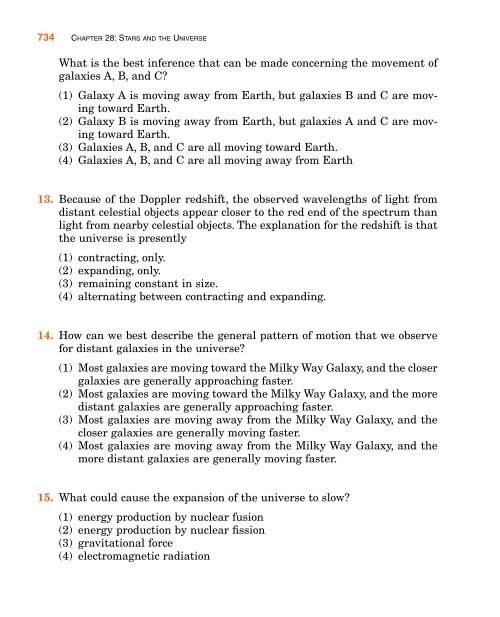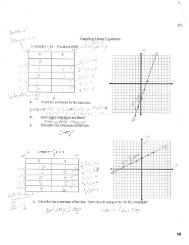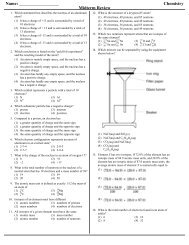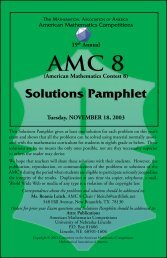Chapter 28 Stars and the Universe
Chapter 28 Stars and the Universe
Chapter 28 Stars and the Universe
You also want an ePaper? Increase the reach of your titles
YUMPU automatically turns print PDFs into web optimized ePapers that Google loves.
734 CHAPTER <strong>28</strong>: STARS AND THE UNIVERSE<br />
What is <strong>the</strong> best inference that can be made concerning <strong>the</strong> movement of<br />
galaxies A, B, <strong>and</strong> C?<br />
(1) Galaxy A is moving away from Earth, but galaxies B <strong>and</strong> C are moving<br />
toward Earth.<br />
(2) Galaxy B is moving away from Earth, but galaxies A <strong>and</strong> C are moving<br />
toward Earth.<br />
(3) Galaxies A, B, <strong>and</strong> C are all moving toward Earth.<br />
(4) Galaxies A, B, <strong>and</strong> C are all moving away from Earth<br />
13. Because of <strong>the</strong> Doppler redshift, <strong>the</strong> observed wavelengths of light from<br />
distant celestial objects appear closer to <strong>the</strong> red end of <strong>the</strong> spectrum than<br />
light from nearby celestial objects. The explanation for <strong>the</strong> redshift is that<br />
<strong>the</strong> universe is presently<br />
(1) contracting, only.<br />
(2) exp<strong>and</strong>ing, only.<br />
(3) remaining constant in size.<br />
(4) alternating between contracting <strong>and</strong> exp<strong>and</strong>ing.<br />
14. How can we best describe <strong>the</strong> general pattern of motion that we observe<br />
for distant galaxies in <strong>the</strong> universe?<br />
(1) Most galaxies are moving toward <strong>the</strong> Milky Way Galaxy, <strong>and</strong> <strong>the</strong> closer<br />
galaxies are generally approaching faster.<br />
(2) Most galaxies are moving toward <strong>the</strong> Milky Way Galaxy, <strong>and</strong> <strong>the</strong> more<br />
distant galaxies are generally approaching faster.<br />
(3) Most galaxies are moving away from <strong>the</strong> Milky Way Galaxy, <strong>and</strong> <strong>the</strong><br />
closer galaxies are generally moving faster.<br />
(4) Most galaxies are moving away from <strong>the</strong> Milky Way Galaxy, <strong>and</strong> <strong>the</strong><br />
more distant galaxies are generally moving faster.<br />
15. What could cause <strong>the</strong> expansion of <strong>the</strong> universe to slow?<br />
(1) energy production by nuclear fusion<br />
(2) energy production by nuclear fission<br />
(3) gravitational force<br />
(4) electromagnetic radiation

















